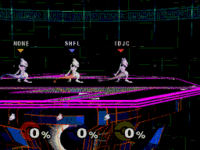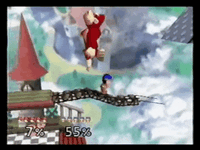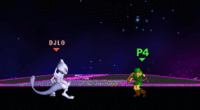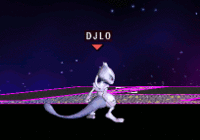| Welcome to SmashWiki! Log in or create an account and join the community, and don't forget to read this first! |
| Notices |
|---|
| The Skill parameter has been removed from Smasher infoboxes, and in its place are the new "Best historical ranking" and "Best tournament result" parameters. SmashWiki needs help adding these new parameters to Smasher infoboxes, refer to the guidelines here for what should be included in these new parameters. |
| When adding results to Smasher pages, include each tournament's entrant number in addition to the player's placement, and use the {{Trn}} template with the matching game specified. Please also fix old results on Smasher pages that do not abide to this standard. Refer to our Smasher article guidelines to see how results tables should be formatted. |
| Check out our project page for ongoing projects that SmashWiki needs help with. |
Double jump cancel: Difference between revisions
(→Lucas: Minor typo fix, and adding link to the double jump cancel zair technique) |
(→Yoshi) |
||
| Line 23: | Line 23: | ||
Yoshi can also use this technique in both ''Smash 64'' and ''Melee'' to "counter" attacks because of his double jump's unique [[armor]] properties. This is referred to as a [[double jump cancel counter]], and is often used to catch the opponent off-guard with a neutral aerial. | Yoshi can also use this technique in both ''Smash 64'' and ''Melee'' to "counter" attacks because of his double jump's unique [[armor]] properties. This is referred to as a [[double jump cancel counter]], and is often used to catch the opponent off-guard with a neutral aerial. | ||
One obvious downfall of this tactic in both games is that Yoshi loses his double jump, possibly resulting in a self-destruct when offstage. This can be extremely detrimental to him, as he lacks a third jump, and if Yoshi is hit away from the stage, Yoshi will have almost no means of recovery, outside of the directional [[air dodge]] in ''Melee | One obvious downfall of this tactic in both games is that Yoshi loses his double jump, possibly resulting in a self-destruct when offstage. This can be extremely detrimental to him, as he lacks a third jump, and if Yoshi is hit away from the stage, Yoshi will have almost no means of recovery, outside of the directional [[air dodge]] in ''Melee''. | ||
In ''SSB4'' and ''Ultimate'', Yoshi does not have a delayed double jump at all, completely eliminating the double jump cancel technique for him. | In ''SSB4'' and ''Ultimate'', Yoshi does not have a delayed double jump at all, completely eliminating the double jump cancel technique for him. | ||
Revision as of 23:25, July 26, 2024
The double jump cancel, sometimes abbreviated as DJC, is a technique in Super Smash Bros. and Super Smash Bros. Melee usable by Yoshi, Ness, Peach, and Mewtwo. These characters have what is known as a delayed double jump, and thus they can jump and double jump from the ground, then attack immediately afterward to cancel their upward momentum and land on the ground soon after their attack. (Without the double jump cancel, the player would have to wait out the full length of the jump or double jump before being able to land.) This tactic is used to perform aerial attacks much more quickly than normal, thus enabling aerial combos and allowing KOs to be performed more quickly.
Double jump canceling was almost largely removed from Super Smash Bros. Brawl onward, as using aerial attacks during a midair jump with Yoshi (Brawl only), Mewtwo or Ness will no longer cancel their upward momentum at all, but instead cause them to use the aerial while still fully rising up, which also applies to Lucas and Sora. However, most of their special moves can still be DJCed normally, which is a trait shared with the aforementioned Lucas and Sora, as well as Kazuya. Also, it is possible for Yoshi and Ness in Brawl to perform a pseudo-double jump cancel on certain stages via platform cancelling, which is useful for mindgames and following up with grounded moves. The technique is completely impossible to perform with Peach from Brawl onward and Yoshi from SSB4 onward, as the aforementioned two do not have delayed double jumps in those games.
Double jump canceling of aerial attacks partially returns in Super Smash Bros. Ultimate as a trait of Kazuya, who can override the sluggish upward momentum of his double jump with faster but much shorter-distanced upward momentum by performing any of his aerial attacks.
Ness
Ness's gameplan in Smash 64 and Melee is almost completely reliant on this technique. Because his aerials provide high hitstun and damage, as well as having large combo ability (especially when coupled with other moves such as his tilts), he can perform zero-to-death combos on several characters. At one point, this ability was even considered broken in Smash 64. However, it has since lost such recognition due to Ness's short range, but nonetheless is an important part of his metagame and should still be commonly used in high-level Ness play in both games. See also shield break jump.
In Brawl, SSB4 and Ultimate, Ness can still double jump cancel his special moves. This enables him to pull off some techniques with a DJCed PK Fire, such as the PK Jump.
Peach
Peach can use this technique in Melee. This allows her to land with aerials with almost no lag and to easily edgeguard her opponents, along with her float cancel, aiding her strong aerial game.
In Brawl, SSB4 and Ultimate, Peach does not have a delayed double jump at all, completely eliminating the double jump cancel technique for her. This also applies to Daisy, who is Peach's clone in Ultimate.
Yoshi
Yoshi's double jump cancel is extremely useful in Smash 64 and Melee, allowing him to quickly throw out neutral aerial chains on floaty characters and up aerials to continue combos on fastfallers. Yoshi's DJC combos are most effective on floaty characters, especially since his up tilt cannot combo them, unlike with fastfallers. Yoshi can often finish his DJC combos with a forward aerial meteor smash on most characters.
Yoshi can also use this technique in both Smash 64 and Melee to "counter" attacks because of his double jump's unique armor properties. This is referred to as a double jump cancel counter, and is often used to catch the opponent off-guard with a neutral aerial.
One obvious downfall of this tactic in both games is that Yoshi loses his double jump, possibly resulting in a self-destruct when offstage. This can be extremely detrimental to him, as he lacks a third jump, and if Yoshi is hit away from the stage, Yoshi will have almost no means of recovery, outside of the directional air dodge in Melee.
In SSB4 and Ultimate, Yoshi does not have a delayed double jump at all, completely eliminating the double jump cancel technique for him.
Mewtwo
The best use of the DJC for Mewtwo in Melee is speeding up its forward aerial, though it can be used to assist its up aerial and back aerial as well (neutral aerial and down aerial take too long to be truly helped by this technique). As with all characters, Mewtwo must not perform the DJC frame-perfect, as it will hit the ground before its air attack connects.
In SSB4 and Ultimate, Mewtwo can still double jump cancel its special moves normally.
Lucas
While Lucas cannot perform DJC aerials, he can double jump cancel his special moves. In SSB4 and Ultimate, DJC specials with Lucas function similarly to other characters listed in this article, but in Brawl, Lucas has unusual techniques such as the Zap Jump that may occur when performing certain DJC maneuvers.
Lucas can also uniquely double jump cancel his grab aerial in Ultimate (known as double jump cancel zair), which is integral to playing him optimally in that game.
Kazuya
Kazuya can use this technique in Ultimate, but when used for his aerials, it differs drastically from the typical DJC. Unlike the other characters listed above (who completely cancel their upward momentum altogether when performing DJC aerials), Kazuya actually retains some of his double jump's upward momentum when he performs a double jump cancel aerial, but the double jump's height is greatly reduced and he will reach its peak much more quickly compared to double jumping normally, akin to characters without delayed double jumps. One of the most prominent uses for this is the "Ferps tech", named after Ferps, which involves using an instant reverse aerial rush delayed instant double jump neutral aerial after a down throw and/or Electric Wind God Fist underneath a platform to quickly land on a platform in order to tech-chase an opponent.
However, Kazuya can double jump cancel his special moves normally. Unlike with his DJC aerials, Kazuya's DJC special moves completely halt his double jump's upward momentum altogether.
Sora
Sora in Ultimate can double jump cancel his special moves. Additionally, his neutral and up aerials are unique in that they interfere with his vertical momentum if he successfully hits an opponent or shield with them; this means that Sora can double jump cancel his neutral and forward aerials, but only if he successfully lands these moves against an opponent or shield.
DJC physics
As detailed on the delayed double jumps page, the four characters in Smash 64 and Melee mentioned above (Yoshi, Ness, Peach and Mewtwo) do not have an immediate upward boost applied upon using their double jump, but rather have a continuous upward force applied throughout the duration of the jump (such that they do not rise immediately). Thus it is possible to interrupt the upwards force with an attack, cancelling the player's momentum and the rest of the force.
A similar mechanic can cause superjumps.
Double jump cancel fast fall L-cancel
Double jump cancel fast fall L-cancel (abbreviated as "DJCFFL") is a tactic that is simply a quicker application of the double jump cancel, and is most often used by Ness, Yoshi, Peach and Mewtwo in Melee. It allows the character in question to attack aerially even faster than with a SHFFL'd aerial.
This technique does not exist in Smash 64 because a fastfall cannot be inputted during an aerial attack.
Instant double jump cancel
Double jump canceling works by allowing the user to perform an aerial attack while remaining close to the ground (most aerial attacks are performed at a short hop's distance from the ground). However, if the user combines a DJC with an instant double jump (known as an instant double jump cancel or IDJC), they will actually hit the ground before the hitbox from their air attack even comes out. This is true of every attack for every character who can DJC.
Execution
To perform this technique, the player must perform their first jump, then double jump after they leave the ground, then perform an aerial attack (Smash 64 and Melee only) or special move immediately after that. The vertical momentum of the player's double jump will be completely canceled and they will perform the move while descending (unless the move interferes with existing vertical momentum, such as various special moves). In Melee, if the move used is an aerial attack, then the player may fast fall almost immediately, and L-cancel the aerial very quickly; the result will cause the character using this technique to perform an attack(s) in the air extremely quickly.
- Techniques (SSBU)
- Techniques (SSB4)
- Techniques (SSBB)
- Techniques (SSBM)
- Techniques (SSB)
- Advanced techniques
- Character-specific terminology
- Ness
- Ness (SSB)
- Ness (SSBM)
- Ness (SSBB)
- Ness (SSB4)
- Ness (SSBU)
- Lucas
- Lucas (SSBB)
- Lucas (SSB4)
- Lucas (SSBU)
- Mewtwo
- Mewtwo (SSBM)
- Mewtwo (SSB4)
- Mewtwo (SSBU)
- Peach
- Peach (SSBM)
- Yoshi
- Yoshi (SSB)
- Yoshi (SSBM)
- Yoshi (SSBB)
- Kazuya
- Kazuya (SSBU)
- Sora
- Sora (SSBU)




